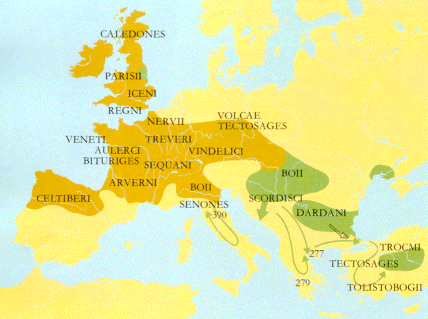|
CELTIC TRIBES

Aedui: One of the main tribes in central Gaul (France), they occupied the
territory around Autun. Because they were close to the Rhône
trade route, they adopted elements of classical culture. By
Caesar's time, inter-tribal fighting resulted in a decline in
their position of supremacy, but by aligning themselves with
Rome, they soon restored their former importance.
Helveti:
This tribe occupied much of modern Switzerland. In first
century A.D., as a result of population growth and pressure
from tribes to the north, they decided to migrate west into
Gaul (France). In 58 B.C. Caesar halted their migration and
defeated them, forcing the survivors to return home to
Switzerland.
Boii: One of the more mobile of the Celtic tribes. In the fifth century
a substantial number migrated from north of the Alps and
settled in the Po valley of Italy. The remainder stayed
in the traditional territories of Bohemia. The north Italian
group suffered under the Roman advance, while those in Bohemia
later migrated west into France and were later forced out by
the Cimbri and Teutons.
Eravisci:
This tribe occupied much of Transdanubia (Hungary) with one of
their principal settlements on the Danube around modern day
Budapest. It is speculated that they moved into the region
from the north in the first century A.D. Eraviscan culture
remained strong throughout the early part of the Roman
occupation: Celtic dress and jewelry continued to be worn even
by the rich families as is witnessed by tombstone reliefs.
Volcae:
Originally neighbors of the Boii in central Europe. An
offshoot of the tribe probably contributed to the Volcae
Tectosages, one branch of ehom settled in southern Gaul
(France) while the other moved into Anatolia. The Gaulish
group possessed a vast treasure of gold and silver which was
pillaged by the Romans in 106 B.C.
Brigantes:
Large confederacy stretching across northern England from the
Irish Sea to the North Sea. In the first century A.D. it seems
to have been allied to Rome, but jealousies broke out between
Queen Cartimandua and her husband Venutius and eventually
Roman troops had to intercede on the queen's behalf. Venutius
was later beaten in a pitched battle.
Parisii: A
tribe living in the region of modern Paris. Their chief city,
Lutetia, was the predecessor of modern Paris.
Nervii: One
of the Belgic tribes of northern Gaul (France) living in
central Belgium, east of the Scheldt. They put up powerful
resistance to Caesar and were virtually annihilated by him.
Venetii:
Maritime tribe living in the southwest of the Armorican
peninsula. They were traders and acted as middlemen in
shipping goods from Britain to the south. In 56 B.C., they
rebelled against Caesar but were soundly beaten in a sea
battle at Quiberon, and as a result all the leading men
executed and the rest sold as slaves.
Averni: A powerful tribe occupying the Massif Central in Caesar's time.
They were violently opposed to Roman rule.
Scordisci: After the migration into Greece had failed, many thousands of
Celts poured back into central Europe to find land to settle.
One group, the Scordisci, led by Bathanatos, settled between
the rivers Drava and Sava with an oppidum on the site of
modern Beograd. They were a powerful force in the subsequent
settlement in the rest of Transdanubia.
Durotriges: Powerful but politically backward tribe occupying the Dorset
region in southern Britain. Vespasian, then a legionary
commander, had to destroy more than twenty native hillforts,
including Maiden Castle, before the tribe itself would submit.
Iceni: British tribe occupying the Norfolk and Suffolk areas. They
allied themselves to Rome after the invasion of Claudius and
were ruled by a client king, Prasutagus. When he died, there
was trouble resulting in a widespread uprising led by Queen
Boudicca. The rebellion was ill-prepared and soon failed.
Trinovantes: Occupied part of modern eastern England just north of the
Thames. In Caesar's time they were in conflict with their
neighbors, the Catuvellauni. They became allies of Rome and
their chieftains grew rich on trade with the Roman world,
acquiring luxury objects and various commodities.
|